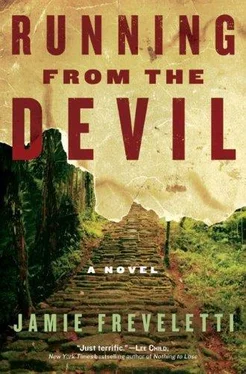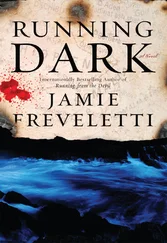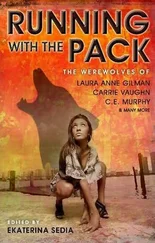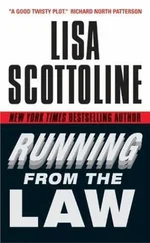Banner smiled. “I’m a business owner now. I haven’t a choice. And you? How is your business? I brought you some medicine for the clinic.”
Perez rubbed his hands together. “IV bags? Needles?”
“And six boxes of vaccines.”
Perez slapped him on the back. “Excellent.” The bartender pushed an espresso cup in Perez’s direction. “Hey, Juan,” Perez said, “bring your little girl to the clinic tomorrow. Vaccines for everyone compliments of my friend here.”
Juan the bartender smiled but said nothing.
Perez downed the coffee in one gulp. “Come on, Banner. I have someone I think you should meet.”
Banner shoved some money under his saucer and stepped away from the bar. Juan reached over, picked up the coffee cup, and pushed the money back at him.
“Thank you for the vaccines, señor.”
Banner took the money and stuffed it in the tip jar. “For the niños.”
Juan nodded his thanks.
Perez drove his battered jeep down the dirt road to the outskirts of town. Educated at a medical school in Grenada before President Reagan decided to “free” it, he’d met Banner during the evacuation. Perez had practiced in hospitals in Miami before returning to this border town. He’d started his clinic to help the local people. Ten years ago, when a paramilitary group threatened to bomb the clinic unless he agreed to pay protection, he’d called Banner in a panic. Banner managed to convince the guerrillas that harassing the only doctor in town was a very bad idea. The convincing took a while. Every day for three straight weeks, Perez’s clinic treated the broken arms and noses of a stream of guerrillas. The same ones who had demanded protection from him were now forced to accept his care. He’d done it quietly and without question. At the end, the guerrillas not only viewed Perez as an untouchable entity but as a friend. Now they routinely brought their own families to him to treat.
The clinic consisted of a series of connected cinder-block buildings in an L shape. Paint peeled from the walls, and the last building’s second floor remained unfinished. Long pieces of rusted rebar jutted out from the roof.
“Still haven’t completed that wing?” Banner said.
Perez sighed. “Every time I try, something arises that requires the funds go elsewhere. Like the person I’m taking you to meet.”
Banner stepped into the cool hallway of the inpatient wing. It smelled like astringent antiseptic and ammonia. A ceiling fan with one broken blade turned slowly overhead. The piece creaked as it completed each turn. Perez waved Banner into a room on the right.
A large woman with tightly curled gray hair and tubes running out of her arm sat up in the room’s only bed. She looked to be in her late sixties. Her skin was gray, but her eyes were bright with intelligence. She wore a hospital gown that tied at the back. Banner could see the strings poking out from behind her neck. The gown had a bizarre, faded pattern of blue flowers intermixed with pictures of teddy bears. The bears wore little blue diapers. Banner gazed at it in fascination. Perez broke his reverie.
“I’ve brought someone for you to meet,” Perez said to the woman. He spoke in a hearty voice, his usual good humor moving up a notch.
“Does he have a cigarette for me?” the woman said, a sly look on her face.
Banner tore his eyes from the diapered bears and laughed.
Perez put on a frown. “Gladys, those are coffin nails.”
Gladys waved a hand in the air. “But it’s my coffin, now, isn’t it, Dr. Perez?” Perez shrugged, giving up.
Gladys peered at Banner. “I’m Gladys Sullivan.”
Banner reached out and shook her hand. “Edward Banner.”
“What’s wrong with your eyes?” Gladys said.
Banner heard Perez suppress a laugh.
“Why do you ask?” Banner said.
“They look surreal. Like liquid tar.”
“I’m wearing colored contact lenses. But I’m surprised you’ve noticed. Most people wouldn’t be able to tell.”
“What’s their real color?” Gladys said.
“Blue.” Banner saw no reason to lie to the woman. He’d liked her on sight, and her request for a cigarette in spite of her obvious dire health condition indicated a woman who knew what she wanted.
Gladys gave a satisfied nod. “That’s better. I like it when a man tells the truth.” She gave him a critical look. “I have to say, each man I see on this journey is better looking than the last. You, mister, are a stunner.”
Banner didn’t know what to say. He was used to women flirting with him in the sideways manner women had, but rarely had a woman so blatantly placed her thoughts on the table. He did his best to ignore Perez, who grinned at him from the corner of the room.
“Thank you, Ms. Sullivan.” It was all Banner could think of to say. He didn’t think Perez had brought him to Ms. Sullivan so that they could have an extended discussion of his looks. To his relief, the doctor changed the subject.
“Gladys has a story to tell you, Banner.” Perez ambled to the door. “While she does, I’ll just arrange to unload the booty you brought.” He left Banner and Gladys staring at each other.
“I’m from Flight 689,” Gladys said.
Banner started. A chrome chair with a torn red vinyl seat cushion sat in the corner. He snagged it, placed it next to her bed, and sat down.
“Perez told me about you. He said you were working with the government on the hijacking.”
Banner nodded. “I am, in a manner of speaking. I’m here to collect a helicopter.”
Gladys heaved a relieved sigh. “I think I’m the last person to see Emma Caldridge. She saved my life. And I’d like you to save hers,” she said.
An hour later, Banner stood next to Perez’s jeep. “Will she live?”
Perez rocked his hand back and forth. “Hard to say. She needs a triple bypass and to stop smoking. She also needs helicopter transport to a major city. I had one lined up through a relief organization, but she ceded her spot to a child with meningitis. Now she has to wait at least three more weeks.”
“If it hasn’t happened by the time I get back, I’ll try to arrange transport.”
“What’d she say?” Perez said.
“She rode with a band of cartel flunkies out of the hijack area. While on the ride, she saw a caravan of trucks carrying what sounds like Dragunov semiautomatic rifles with telescopic sights.”
Perez gave a low whistle. “Cartels arming for a fight?”
Banner shook his head. “Apparently not. She said they were headed to the ocean to be smuggled into Miami. She said some American businessmen were assisting in the transport. She knew this because she’d seen them earlier at a checkpoint location.” He yanked open the jeep’s door. “But that whole story isn’t what worries me. What worries me is that these gunrunning Americans were focused on finding one particular passenger.”
“What’s so special about this passenger? Didn’t most die in the crash? And the rest taken hostage?”
Banner nodded. “The only people that know this passenger is alive are with the Department of Defense. Looks like our hijacking friends have some help from the inside the States.”
Perez’s mouth dropped open.
47
EMMA RAN INTO THE SMALL PRISON HUT AND STUMBLED OVER Maria, who was hovering just inside the doorway. Vivian crouched at the edge of the pit, staring downward. Alvarado hung there, his body impaled on the sticks. One went straight through him and came out his back. His arms were stuck out at ninety-degree angles from his body. He looked like he’d been crucified. Blood was everywhere.
“Did you push him?” Emma said.
Vivian shook her head. “No. He slipped when he reached the edge and fell straight forward.”
Читать дальше












